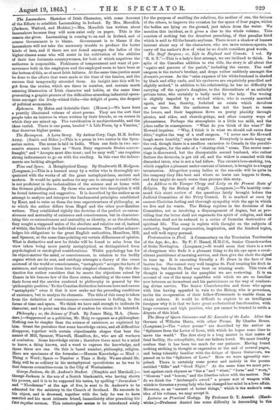Time and Space. A Metaphysical Essay. By Shadworth H. Hodgson.
(Longman.)—This is a learned essay by a writer who is thoroughly ac-
quainted with the works of all the great metaphysicians, ancient and modern. It would be quite useless for any one to attempt to read it who is not proficient in the technicalities of the science and at home with the German philosophers. By those who answer this description it will be found interesting and suggestive. It is described by the author as an attempt to analyze and interpret the fundamental principles established by Kant, and to raise on them the true superstructure of philosophy, as to which the anther differs from Hegel and the other post-Kantian writers. They established rightly the doctrine of the perfect co-exten- siveness and mutuality of existence and consciousness, but in character- izing this co-extensiveness and mutuality as identity, or as the absolute, they sought a supposed union of the absolute and relative out of, instead of within, the limits of the individual consciousness. The author acknow- ledges his obligations to the great English authorities, Hamilton, Mill, and Spencer, at the same time pointing out certain differences of opinion.
What is distinctive and new he thinks will be found to arise from the view taken being more purely metaphysical, as distinguished from psychological or ontological considerations. Whilst psychology has for its object-matter the mind, or consciousness, in relation to the bodily
organs which are its seat, and ontology attempts a theory of the causos existendi of the world or consciousness, "metaphysic" accepts the facts of
existence, and analyzes them into their simplest elements. By this dis- tinction the author considers that he meets the objections raised by Comte in his famous law of the three states admitting at the same time their force and the service rendered to philosophy in general by the 'philosophic+ positive.' To the Comtian distinction between laws and causes "metaphysio " owes it that it now seeks not the preceding conditions of existence, hut to analyze its elements. The title of this essay is taken from the definition of consciousness—consciousness is feeling, in the forms of time and space. We think we have said enough to indicate its character, and to point out the class of readers for whom it is intended.






























 Previous page
Previous page